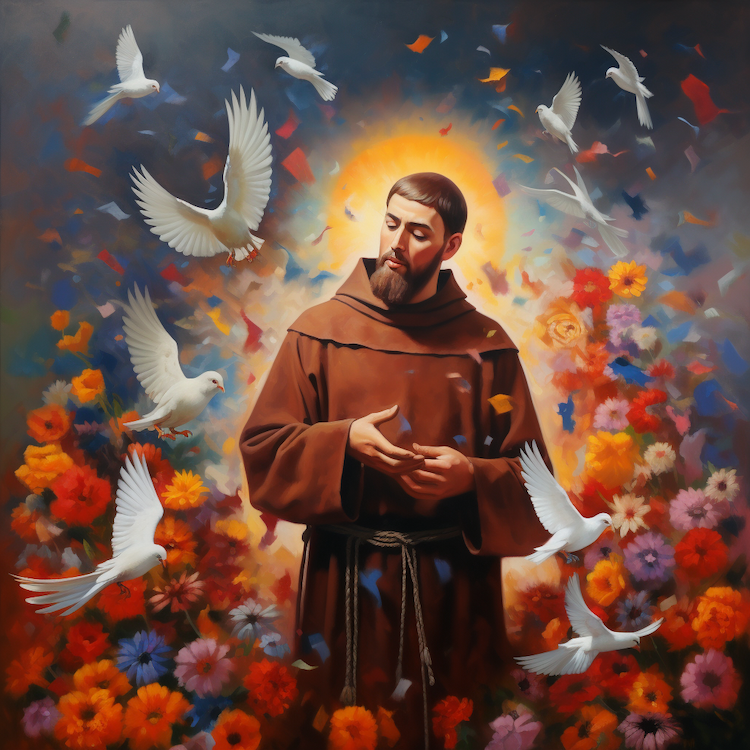Saints Saint Francis of Assisi
Saint Francis of Assisi is one of the most venerated religious figures in history and one of the most famous saints in the Catholic Church. Born as Giovanni di Pietro di Bernardone in Assisi, Italy, in 1181, he would go on to establish the Franciscan Order and become renowned for his devotion to simplicity, poverty, and love of nature.
Giovanni was the son of a prosperous silk merchant, Pietro di Bernardone, and his wife, Pica. Despite his father's wealth, Francis was drawn to the life of the poor from a young age. However, this didn't stop him from enjoying the comforts of his wealthy upbringing and participating in the vibrant social scene of Assisi. His father intended for him to take over the family business, but his life took a different path.

As a young man, Francis was captured during a conflict between Assisi and Perugia and spent a year as a prisoner of war. This experience had a profound effect on him, and after his release, he began to question his life of privilege. A subsequent serious illness further deepened his spiritual introspection.
Francis had a transformative experience in 1206 when he encountered a leper. Whereas he was usually repulsed by lepers, this time he embraced the man. This act symbolized a turning point in his life, marking the beginning of his commitment to a life of radical poverty and service to the poor.
Later, while praying in the dilapidated chapel of San Damiano, he had a vision in which he heard the voice of Christ telling him to "rebuild my church, which is falling into ruins." He took this command literally and began repairing the chapel stone by stone, funding his work by selling his father's cloth. His father, enraged by his behavior, disowned him, and Francis renounced his inheritance and familial ties, living from then on as a hermit in the countryside around Assisi.
He was not alone for long, however. His commitment to poverty, his joyous faith, and his respect for all of God's creation attracted a band of followers. In 1209, he founded the Order of Friars Minor, more commonly known as the Franciscans, based on a simple rule of preaching the Gospel and living in poverty.
Francis's love for nature, especially his affinity for animals, is legendary. Stories depict him preaching to the birds, taming a wolf, and even celebrating a Christmas Mass with a live nativity scene, starting the tradition of the Christmas crèche. His "Canticle of the Sun," composed in 1224, is one of the earliest known pieces of literature in the Italian language, expressing his deep sense of brotherhood with all creation.
In 1224, Francis reportedly received the stigmata, the wounds of Christ, during a religious ecstasy, becoming the first recorded stigmatist in Christian history. His health declined rapidly after this, and he died on October 3, 1226, at the age of 44. He was canonized as a saint just two years later by Pope Gregory IX.
St. Francis of Assisi's life and teachings have had a lasting impact on the Catholic Church and beyond. He is the Patron Saint of animals and the environment, a testament to his message of universal brotherhood and his love for creation. His commitment to peace, social justice, and service to the poor continues to inspire millions around the world.
Learn more about The Saints.